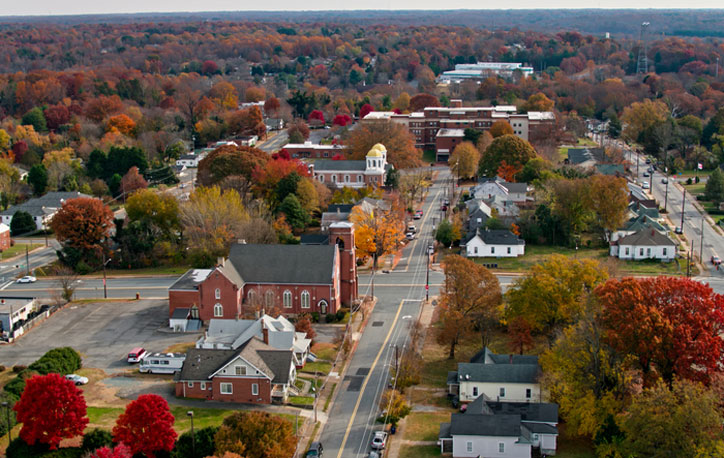Make a Difference
North Carolina Master of Social Work (MSW)
Social workers devote their lives to making a difference in their communities and the world at large. Those who take on this difficult but invaluable profession discover the deep rewards of helping others.
A social work degree gives you the skill and expertise to help those in need.
If you’re an aspiring social worker based in North Carolina, this website will provide all the information you need to start a meaningful and long-lasting career.
Social Work Degrees Build Skills That Change Lives
Social workers are involved in all types of work, from counseling and other therapeutic services to providing administrative and logistical support to those without resources. A social work degree helps you build up the expertise to provide help in these critical situations, offering the training and background knowledge to meet crises head on.
In a social work degree program, you will learn:
- Clinical counseling techniques and methodologies
- Mental health assessment and diagnosis
- Case management
- Approaches to community-based support
- Advocacy and policy reform
- Crisis intervention
- Administration and leadership skills
By learning these skills, you will be able to provide the best support possible to people who need it, offering compassion with a strong basis of training and education to address problems deeply and effectively.
Social Work Degree Types
No matter what level of degree you hold, there are social work schools in North Carolina that can help you work your way toward a thriving career as a social worker.
In order to hold the full responsibilities of a social worker, one must hold a Master of Social Work (MSW) degree.
There are many excellent Master of Social Work schools in North Carolina, which is good news for anyone hoping to get their MSW. However, if you don’t yet hold a bachelor’s degree, you will need to complete your undergraduate education first.
Take a look at the following social work degree types to determine which one is right for you.

Bachelor of Social Work (BSW)
Typical duration: 4 years
Those who don’t yet hold a bachelor’s degree will need to obtain one in order to qualify for an MSW program. If you did not attend undergraduate college but know that you would like to become a social worker eventually, you will be able to do this the most quickly by pursuing a Bachelor of Social Work degree. A BSW program will give you the foundational knowledge you need to understand social work as a field.
Learn more about colleges that offer social work programs for undergraduates

Master of Social Work (MSW)
Typical duration: 2 years
An MSW is the requisite degree to qualify for social work licensure in the state of North Carolina. In an MSW program, you will learn the fundamentals of the social work profession, from historical contexts of civic issues in the US to methodologies for supporting others. MSW programs typically also feature a field work internship to provide exposure to the day-to-day responsibilities of a social worker in whatever area of specialty you intend to focus on in your career.
Learn more about MSW programs
Advanced Standing MSW
Typical duration: 1 year
Those who hold a BSW degree can bypass the first year of their MSW program, as the coursework overlaps with their undergraduate education. This means your graduate studies will be primarily focused around your field work, giving you on-the-ground experience to prepare you for your duties on the job.
Learn more about advanced standing MSW programsOnline Social Work Degree Programs Make It Easier than Ever to Become a Social Worker
Thanks to the arrival of remote conferencing technology, more and more people have the opportunity to pursue their social work education. Whether you have scheduling difficulties due to your existing job or family responsibilities, or if you are not living in a location with easy access to an educational program, you now don’t have to worry about bending over backwards to pursue the education you want.
There are many excellent online programs connected to the best schools in North Carolina for social work.
Many colleges that offer social work programs make them available on a part-time basis, with nighttime or weekend classes to provide more convenient educational opportunities for people who work. This is great news for anyone who has aspired to become a social worker but hasn’t known how they could meet the educational requirements to get there.
Learn more about online social work schools near me
What Does a Master of Social Work Degree Involve?
As mentioned above, most Master of Social Work programs take two years to complete. Some colleges with MSW programs allow students to pursue their studies on a part-time basis, meaning they are likely to take longer, though the education you receive will be the same as in a full-time program.
Learn More About MSWs
Foundational MSW coursework draws from a variety of disciplines including anthropology, history, psychology, and sociology. You will learn about the systematic causes of the crises communities face in the United States, strategies to alleviate these causes, and the psychological effects of these crises. You will also learn about the approaches and methodologies used by social workers to help those in need so that you can manage your work and tend to others’ needs responsibly.
Most Master of Social Work schools in North Carolina include mandatory field work hours, which will comprise a significant amount of your curriculum during your second year of school.
Field work internships are a key part of your education, giving you on-the-ground exposure to the daily duties and responsibilities of your chosen career path.
This can be a critical step for those who are determining what job they want, as it will be the most direct opportunity to get a sense of what your professional future will look like. In some cases, these field work experiences can even lead to job offers, paving the way for your first paid job as a social worker.
In the field of social work, different types of licensing allow for different responsibilities. Depending on the career you want, your MSW education is likely to lead you toward one of the following two license levels:
Licensed Clinical Social Worker (LCSW)
If you are interested in becoming a counselor or therapist, you will need to pursue standing as a Licensed Clinical Social Worker. LCSWs are the only social work professionals authorized to perform clinical services to patients, which extends to group therapy and other counseling modalities. The bulk of LCSW preparation consists of extended supervised field work hours, typically amounting to about two years after your MSW program is complete.
Find top LCSW degree programs near me
Licensed Master Social Worker (LMSW)
Those who are not planning on performing clinical duties are still advised to pursue licensure after completing their MSW program, as most social work jobs will require you to have one license or another. Directly upon receiving your MSW, you are eligible to take the LMSW exam, which will allow you to perform important social work duties like case management, community advocacy, and high-level administrative responsibilities.
Careers
Social Work Career Paths
Most MSW schools will help you find your intended focus area, helping you define a career path that will allow you to provide direct support to individuals and communities addressing the causes that you care about.
You don’t need to know what kind of specialist you’d like to be at the outset of your MSW program. Rather, you can use your time in school to find the path that’s right for you.
Some of the top social work focus areas include the following:
- Aging and Gerontology
- School Counseling
- Addiction and Mental Health Services
- Healthcare Social Work
- Disability Services
- Advocacy and other policy related work
North Carolina Jobs by City

Jobs and Salaries in Asheville
Asheville, North Carolina, a city known for its vibrant arts scene and stunning Blue Ridge Mountain views, offers a diverse range of meaningful employment opportunities for social work professionals.
Learn more about social work jobs and salaries in Asheville
Jobs and Salaries in Chapel Hill
For people who are dedicated to making a tangible difference in Chapel Hill, North Carolina, social work is a dynamic and rewarding field with promising professional opportunities.
Learn more about social work jobs and salaries in Chapel Hill
Social Worker Jobs and Salaries in Charlotte
Social work jobs in Charlotte, North Carolina, offer a diverse range of opportunities for professionals dedicated to making a difference in their communities.
Learn more about social work jobs and salaries in Charlotte
Jobs and Salaries in Durham
Durham, North Carolina is the fourth-most populous city in the Tar Heel State. Home of Duke University, the Bull Durham Blues Festival, and the legendary singer Roberta Flack, Durham is a diverse and fast-growing region.
Learn more about social work jobs and salaries in Durham
Jobs and Salaries in Raleigh
With a growing population and a strong emphasis on social services, the demand for skilled social workers is higher than ever in Raleigh
Learn more about social work jobs and salaries in Raleigh
Jobs and Salaries in Winson-Salem
A vibrant city with a population of around 250,000 people, Winston-Salem, North Carolina offers a rich blend of history and modern culture.
Learn more about social work jobs and salaries in Winston-SalemJob Titles
If you do happen to already know which specialization you’d like to pursue as a social worker, it may benefit you to look into specific Masters in Social Work schools in North Carolina, as some are known for particular programs or field work opportunities related to key focus areas.
There is a wide range of career opportunities for social workers in North Carolina, who hold varying responsibilities and are engaged with a large number of social causes. Some of the top job titles for social workers include the following:
- Addiction and Mental Health Counselor
- Behavioral Health Counselor
- Child Advocate
- Family Therapist
- Intervention Specialist
- Outpatient Specialist
- Patient Advocate
- School Social Worker
- Social Services Coordinator
- Trauma Therapist
- Victim Advocate
These are just a few of the jobs you can hold if you complete graduate school for social work.
Learn more about social work career paths and salary ranges here
Degree and Licensing Requirements
In order to become a licensed social worker in North Carolina, one must hold an MSW from an accredited program. To qualify for an MSW, you must first hold a bachelor’s degree in any subject. While it is by no means a requirement to hold a BSW in order to qualify for an MSW, those who do hold Bachelor of Social Work degrees will benefit from an accelerated course of study in graduate school.
Both LCSW and LMSW certifications require Master of Social Work degrees. This means you cannot pursue a social work credential without first completing a social work degree program.
While in school, your program is likely to help you prepare for your qualifying exams and learn the key dates and deadlines to receive your license on the timeline that works for you.
Learn more about social work career paths and salary ranges here
Social Work FAQs

Common MSW Questions & Answers
Yes. It is not possible to receive a social work license without an MSW, meaning you cannot perform the full responsibilities of a social worker without obtaining your degree first. Those who do not hold MSWs may be able to take low-level administrative roles in social work organizations, but they will not be able to rise in the ranks without the appropriate degree and license.
A full-time MSW program will take two years to complete. Part-time programs may take longer, as they will have smaller course loads each semester.
There are many fantastic MSW program offerings available in the state of North Carolina. To find the one most suited to your schedule, interests, and academic needs, take a look at our school directory here .
A Licensed Clinical Social Worker (LCSW) can perform clinical duties, which means direct counseling or other therapeutic services. Without clinical licensing, you are not able to perform these roles, even if you hold an MSW degree. Licensed Master Social Workers (LMSWs), meanwhile, are not eligible to perform clinical duties but can take all other high-level roles in social work organizations, from advanced administrative roles to leadership positions. It is strongly advised to pursue one of these forms of credentialing, as most social work jobs in North Carolina will require them.
You don’t need to know your intended area of specialization before beginning your MSW degree program. While in school, you’ll learn about each branch of social work extensively, allowing you to make an informed decision before you begin the field work component of your master’s program.












